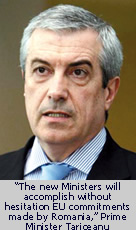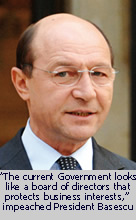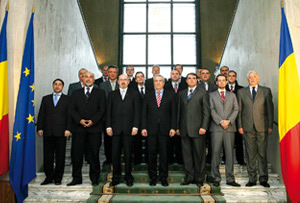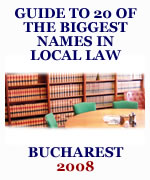Fragile and controversial minority takes hold of Romania
Prime Minister Tariceanu has made the boldest political move of his career, which will bury or crown his legacy
|
 Prime Minister Calin Popescu Tariceanu has kicked out the Democratic Party (PD) from power and formed a new Government which has attracted criticism from civil society and concern from the business community.
Prime Minister Calin Popescu Tariceanu has kicked out the Democratic Party (PD) from power and formed a new Government which has attracted criticism from civil society and concern from the business community.
It also ends any hope of reconciliation between the Prime Minister and President Basescu, who was elected in 2004 as a representative of the PD policy.
Moreover, Basescu was in the meantime impeached and is expecting a referendum to choose whether he continues in office.
The new leadership includes 18 men from the National Liberal Party (PNL) and the Democratic Union of Hungarians from Romania (UDMR).
“The current Government looks like a board of directors that protects business interests and not in the common interest,” President Basescu said, before the Parliament impeached him.
The two parties in power have formed a minority Government from around 23 per cent of the members of the two legislative chambers.
“We did not want this change,” said UDMR president Bela Marko. “We would have opted for the current cabinet formula, but a deadlock appeared which had to be solved.”
Freed from having to satisfy Brussels to ensure entry into the EU, Tariceanu’s move is probably not something that could have taken place this time last year.
EU representatives have reserved any direct criticism of the new Government, because they cannot interfere in another state’s affairs.
But this move means the removal of Monica Macovei, independent Minister of Justice and Vasile Blaga, PD Minister of Interior Affairs, both praised for their reform-minded policy, only this March, by EU Commissioner for Justice Franco Frattini.
Following the expulsion of the PD and independent from Government, Bulgarian European Commissioner, Meglena Kuneva, also chose the moment to congratulate sacked Minister of European Integration, Anca Boagiu, and Macovei for their input into the Romania’s EU accession.
Last month Tariceanu assured Frattini that the new team of ministers would accomplish “with no hesitation” commitments made by Romania to the European Union.
But the Prime Minister’s move is not seen by civil society as one honouring democracy or placing the correct people in the right jobs.
Instead, it is viewed as establishing a choice of ministers based on loyalty to a particular wing of the National Liberal Party.
“What kind of flaws did the old Government have?” said Sorin Ionita, one of the most active members of the Romanian civil society.
“And where is the proof that the new ministers can handle the problems? This was a move only meant to get rid of the Democratic Party.
From the point of view of the people chosen for these high positions, this is a weak Government that lacks inspiration and has suspicious second-hand members.”
Alliance expired
This signals the end of any prospect of resuming the DA Alliance between the National Liberal Party and the Democratic Party, which came to power at the beginning of 2005.
Prime Minister Tariceanu’s decision is a body-blow to now impeached President Basescu, whose greatest allies remain in the party of which he was a member, the PD.
The Head of State warned the Parliament that if it approves the new Government, there is a risk of a rupture between the political class and Romanian society.
The new ministers were voted in by PNL, UDMR, the Social Democratic Party (PSD) and by some members of the Conservative Party (PC) and the extremist Greater Romania Party (PRM), while the Democrats abstained.
The Social Democrats and the Conservatives will support some of the decisions of the new Government, in order to secure a majority in Parliament.
War game
 Basescu has prepared a “declaration of war” on the new parliamentary coalition. He accused the new coalition gathered around PM Tariceanu is defending an oligarchic system with illegitimate interests that benefit at the detriment of the state and the people. “I have the power to fight those who want a corrupt Romania where Governments can be formed and taken apart in total contempt to the public interest,” he said.
Basescu has prepared a “declaration of war” on the new parliamentary coalition. He accused the new coalition gathered around PM Tariceanu is defending an oligarchic system with illegitimate interests that benefit at the detriment of the state and the people. “I have the power to fight those who want a corrupt Romania where Governments can be formed and taken apart in total contempt to the public interest,” he said.
No bubbly for Liberals
But Basescu did approve the new Government, following Parliament’s recognition. He greeted and swore in the new ministers at his seat of power, Cotroceni Palace. But in a break from tradition, no national anthem was played as he shook hands with the new ministers. Nor did the president’s caterers serve any Champagne.
Business doesn’t care
Views from the business community to the political turmoil veered from the indifferent to the fearful, but with little optimism.
“The perception outside the country is that Romania has fired its Minister of Justice who, whether she was good or not, was fighting corruption and as a result she was canned, because she was getting too close to some influential people,” said one US businessmen resident in Romania.
Over three quarters of Romania’s economy is in private hands. The turmoil will not affect the current economic boom, argue most analysts.
However, it could hold up the privatisation of state assets. The next two years is seen as the best time to sell off the three remaining power distributors and energy complexes Turceni, Rovinari and Craiova, which are estimated to be worth billions of Euro. These need huge investment as soon as possible – money that cannot be provided by a Government unable to grant state aid.
“Here they have a golden opportunity and it seems like the politicians are doing everything they can to fuck it up,” said one businessman connected to the energy sector.
Business people argue the only advantage Romania has over its neighbours is that there is also political unrest in Serbia, Moldova and Ukraine.
The new partner of the PNL in Parliament, the PSD, opposes the introduction of the flat tax of 16 per cent on incomes and profits in 2005. All business people The Diplomat spoke to argue that any attempt to reverse the decision to continue with the flat tax with a more punitive tax regime on high-earners could damage foreign investment.
Election cost
The popularity of the new Government will be put to the test in the European elections this Autumn. This will also be the first indication as to how the public will vote in the 2008 general elections.
However, PNL’s decision-making powers in Government are restricted to those approved by its new parliamentary ally, the PSD, which is the Liberal’s ideological opposite. This is unlikely to satisfy the Liberal Party’s core voters.
The 18 month lead-time to the elections could give the now out-of-office Democratic Party and the Liberal Democrat Party (PLD) time to build up a solid campaign of attack. President of the Romanian Academic Society (SAR) Alina Mungiu-Pippidi believes that Tariceanu, by throwing out the Democrats from Government, has chosen to lose the general elections next year.
“This gives PNL only one political option, to become an ‘annex party’, which means that from now on the Liberals will only stand a chance of winning an election if they service other big parties, such as the PSD,” she says.
PSD leader Mircea Geoana has claimed that his party would never support a move such as the flat tax of 16 per cent on profits and incomes that Tariceanu introduced in 2005.
Economists saw this move as the one tangible piece of smart legislation by the new Government – satisfying both the electorate and business and clearly following a Liberal ideal.
If the PSD is against this, it is likely to be against similar ideological policies from the PNL. This could alienate the Liberal supporters, who Pippidi calls, among “the most well-informed” of the electorate.
Women lose
There are no women in the Government, which President of Transparency International Romania, Victor Alistar, views as a concern. It could also break a law which states that all decision makers in public institutions must have female representatives.
“We might have an issue of discrimination,” he says. “At least for the public image, they should have put a woman in the Government.”
But Transparency International Romania gives the fresh-faced Government “boys” the presumption of innocence.
“Let’s not forget that Romania is being monitored by the European Commission (EC) until 2010,” he says.
“The EC will not indulge Romania if the Government won’t do its job and will criticise the ministers if requirements such as the creation of the National Integrity Agency (ANI) [which monitors politicians’ wealth declarations] are not fulfilled.”
All change at the top
 Prime Minister Tariceanu has streamlined the ministries from 20, including himself as Head of Government, to 18. This includes merging the Ministry of Economy and Trade with the Ministry of Finance and creating two other ministries - for Small and Medium-sized Enterprises and for Development.
Prime Minister Tariceanu has streamlined the ministries from 20, including himself as Head of Government, to 18. This includes merging the Ministry of Economy and Trade with the Ministry of Finance and creating two other ministries - for Small and Medium-sized Enterprises and for Development.
Eugen Nicolaescu remains Minister of Health and Adrian Iorgulescu stays as Minister of Culture and Religious Affairs. The Minister Delegate for the Government’s relations with Parliament will continue to be under the jurisdiction of Mihai Voicu, a close friend of Tariceanu. But everyone else has switched.
Hungarian Party score biggest win
Minister Bela Marko retains his position of deputy Prime Minister co-ordinating activities in Culture, Education and European Integration.
His name is on top of the list of “dirty ministers” exposed by NGOs in Romania under the name of ‘The Coalition for a Clean Government’. A poet and president of the UDMR, Marko is under investigation by the Anti-Corruption Department (DNA) for taking an advance of 30,000 Euro from a non-existent publisher for a book that he did not write.
The new Minister of Environment and Sustainable Development is Attila Korodi, former secretary of state in environmental issues.
A UDMR member since 2004, 29 year-old, Korodi will be the youngest minister in Romania since 1989. He stood out due to his critical position towards the proposed Rosia Montana gold project in Transylvania, which is under analysis by the Ministry of Environment. This may prejudice his ability to make an independent judgement on the viability of the project. Since then, the Minister has stated that the Rosia Montana project is a “priority to investors, but not to Romania”.
The new Minister of Development, Public Works and Housing is 53 year-old Laszlo Borbely, who will take over the responsibilities of the former European Integration Ministry.
The Ministry of Communication and Information Technology remains with 35 year-old Zsolt Nagy, who is currently under investigation by the General Prosecutor’s Office for allegedly leaking secret information to business consultants on sensitive Government privatisations in the telecom sector.
Liberals take the prize
 The new Ministry of Economy and Finance is headed by 49 year-old Varujan Vosganian, who has been Minister of Economy and Trade.
The new Ministry of Economy and Finance is headed by 49 year-old Varujan Vosganian, who has been Minister of Economy and Trade.
He will co-ordinate the absorption of billions of Euro in EU Structural Funds. At the end of last year, Tariceanu nominated Vosganian for the post of Romania’s European Commissioner. But European officials expressed concerns over his alleged connections with the former Communist Secret Service. Although there was no proof, he was replaced by former chief negotiator for EU integration, Leonard Orban.
The Ministry of Agriculture is now in the hands of 57 year-old Decebal Traian Remes. Tariceanu brought Remes back to the front-line after the former Finance Minister (1998 to 2000), spent years in the political wilderness. Remes was a challenger to former Liberal boss Theodor Stolojan, whose election as party leader in 2000 forced Remes to resign. He is also known for his rivalry with another new Liberal Minister, Ludovic Orban.
 The Ministry of Defence is now in the grasp of 66 year-old Teodor Melescanu who, like Remes, is a member of the Liberal old guard. Melescanu supports Romania’s troop withdrawal from Iraq, which he intends to complete by the end of the year. But when he came into office, he said this would only happen following negotiations with the USA. Senator Melescanu was, between 1992-1996, the Foreign Affairs Minister in Nicolae Vacaroiu’s Social Democratic Cabinet. He served in the Communist-era Foreign Ministry, including first secretary in the Department for International Security and Disarmament (1985) and has been accused of collaborating with the former Securitate, but charges were never proved.
The Ministry of Defence is now in the grasp of 66 year-old Teodor Melescanu who, like Remes, is a member of the Liberal old guard. Melescanu supports Romania’s troop withdrawal from Iraq, which he intends to complete by the end of the year. But when he came into office, he said this would only happen following negotiations with the USA. Senator Melescanu was, between 1992-1996, the Foreign Affairs Minister in Nicolae Vacaroiu’s Social Democratic Cabinet. He served in the Communist-era Foreign Ministry, including first secretary in the Department for International Security and Disarmament (1985) and has been accused of collaborating with the former Securitate, but charges were never proved.
The Ministry of Transport is in the hands of 44 year-old Ludovic Orban, who has been deputy mayor of the Capital.
He is also the brother of the European Commissioner for Multilingualism, Leonard Orban. Motorway construction is Orban’s first priority, including speeding up the work, simplifying the auction procedure and finding finance. Another goal for Orban is to increase Danube river transport, which suffers from inconsistency in its water levels and a lack of sufficient navigable channels. Orban is one of the most candid critics of Basescu, even claiming that the head of state had “the face of a killer”. Orban, like Tariceanu, is a close friend of Liberal businessman and president of Rompetrol Dinu Patriciu.
 The Ministry of Foreign Affairs has gone to 40 year-old historian Adrian Cioroianu, who only joined politics in 2002.
The Ministry of Foreign Affairs has gone to 40 year-old historian Adrian Cioroianu, who only joined politics in 2002.
The Minister said he is willing to be the “buffer” between the President and the Prime Minister, to absorb possible tensions. His policy intends to remain consistent with that of his Liberal predecessor, Mihai Razvan Ungureanu, who was sacked by Tariceanu. Cioroianu, who has a PhD in history from Laval University, Quebec, is one of the initiators of the lustration law which intends to prevent former collaborators with the Securitate from taking up senior public postings. This law is, for now, dead.
The new Ministry of Education, Research and Youth went to 32 year-old construction engineer Cristian Adomnitei. Adomnitei, a Iasi deputy, has been working as a site supervisor for two private companies and ran the Buildings Department for the Romanian Railways Company - CFR.
The new Ministry of Labour, Family and Equality of Chances is headed now by 57 year-old senator Paul Pacuraru, who intends to put into practice the Lisbon Agenda.
The new Minister for Small and Medium-sized Enterprises, Trade, Tourism and Liberal Profession is 45 year-old Ovidiu Silaghi, who was vice president of the European Parliament’s Commission for Budget Control.
The new Ministry of the Interior and Administrative Reform will go to 40 year-old Cristian David, who said he would continue the reforms made by his predecessor Vasile Blaga. Since 2004 David worked as Minister Delegate in the Romanian Government supervising the enforcement of the Acquis Communautaire.
The Ministry of Justice went to 30 year-old Tudor Chiuariu, who has pledged for an independent justice that will not be used as an instrument in political infighting. He follows Monica Macovei, whose ‘no compromise’ stance on reforming the corrupt and stagnant Romanian Justice system was seen as the major reason Romania managed to secure EU accession in 2007 and not a humiliating entry in 2008.
“I don’t wish to be a Robin Hood of Justice, because after a Joan of Arc there is no need for a Robin Hood,” he said, reassuring the electorate that he will not undertake armed hold-ups on wealthy lords, barons and duchesses.
“By nominating a politician as the head of this ministry, the co-operation between the Government, the magistracy and the Parliament might be improved,” says the president of NGO Society for Justice, Horatius Dumbrava.
By Ana Maria Nitoi and
Michael Bird









